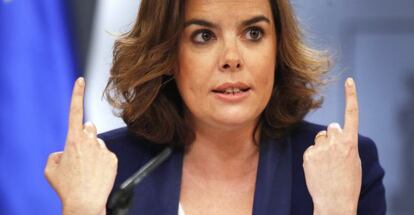Rajoy government backed disgraced Dívar to the hilt
Deputy prime minister called on Basque Nationalist Party for support "It is normal for us to talk about strengthening our institutions," says Saénz de Santamaría

Even as public anger mounted over the refusal of Carlos Dívar to step down as Chief Justice and head of the General Council of the Judiciary, and, one by one, his colleagues on the judiciary oversight board distanced themselves from him, the government continued to back him, looking for support from the Basque Nationalist Party (PNV) and the ruling grouping in Catalonia, the CiU Catalan nationalist bloc.
Deputy Prime Minister Soraya Saénz de Santamaría has admitted to asking Josu Erkoreka, the PNV's spokesman in Congress for the telephone number of Margarita Uría, a member of the PNV who sits on the CGPJ, hoping to persuade her to rally support for Dívar.
Uría told Erkoreka that she was not interested in talking to Saénz de Santamaría, pointing out she had already publicly called for Dívar to step down.
At a meeting of the CGPJ on June 16, Uría told her fellow members that the government had been talking to the PNV, saying she was angry it had been trying to pressure her to support Dívar.
Prime Minister Mariano Rajoy's government has backed Dívar throughout the affair
"It is normal for us to talk about how we can work to strengthen our institutions, it would be unusual not to," Saénz de Santamaría told journalists, but refused to comment on Uría's complaint.
"I always exchange opinions with other parties when an institution is in a delicate situation. It would not be normal otherwise. I can also say that others asked me first."
Prime Minister Mariano Rajoy's government has backed Dívar throughout the affair. Speaking in Congress in May after the allegations were first made against Dívar regarding his alleged use of public money to pay for jaunts to the coast, Justice Minister Alberto Ruiz-Gallardón expressed his happiness that Dívar had not stepped down. He praised the chief justice, saying his approach was strengthening the CGPJ and adding that he did not believe Dívar should appear before Congress to explain himself.
Speaking on the day that Dívar resigned, Ruiz-Gallardón refused to comment, saying the government was now "looking to the future."
He said the government would be working with the CGPJ "so that the deserved prestige of our justice system and the extraordinary work of our judges and magistrates and others in the judiciary is fully recognized by the public."
A recent survey showed that Spain's highly politicized judiciary was the least respected of its key institutions. Judges and prosecutors are openly aligned with "conservative" and "progressive" factions. They often owe their positions to patronage from, respectively, the governing Popular Party and the opposition Socialist Party.
Ruiz-Gallardón has refused to comment on why the government continued to support Dívar.
On May 31, when Dívar called a press conference to explain the allegations against him, without providing any details, Gallardón described the move as "an exercise in responsibility."
Tu suscripción se está usando en otro dispositivo
¿Quieres añadir otro usuario a tu suscripción?
Si continúas leyendo en este dispositivo, no se podrá leer en el otro.
FlechaTu suscripción se está usando en otro dispositivo y solo puedes acceder a EL PAÍS desde un dispositivo a la vez.
Si quieres compartir tu cuenta, cambia tu suscripción a la modalidad Premium, así podrás añadir otro usuario. Cada uno accederá con su propia cuenta de email, lo que os permitirá personalizar vuestra experiencia en EL PAÍS.
¿Tienes una suscripción de empresa? Accede aquí para contratar más cuentas.
En el caso de no saber quién está usando tu cuenta, te recomendamos cambiar tu contraseña aquí.
Si decides continuar compartiendo tu cuenta, este mensaje se mostrará en tu dispositivo y en el de la otra persona que está usando tu cuenta de forma indefinida, afectando a tu experiencia de lectura. Puedes consultar aquí los términos y condiciones de la suscripción digital.








































